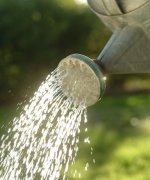 There is no simple recipe for advising on the right amount, or frequency of watering, as there are so many environmental and other factors that determine a plant’s needs. This includes the climate, type of soil, ambient air temperature and local wind conditions.
There is no simple recipe for advising on the right amount, or frequency of watering, as there are so many environmental and other factors that determine a plant’s needs. This includes the climate, type of soil, ambient air temperature and local wind conditions.

Factors that have influence to watering frequency:
- season
- climate
- ambient air temperature
- size of plant counts
- type of soil
- local wind conditions
 However, bear in mind that, regardless of any other preference of the species for summer or winter rainfall, neither cacti nor succulents appreciate standing in wet ground, where soil moisture does not drain away.
However, bear in mind that, regardless of any other preference of the species for summer or winter rainfall, neither cacti nor succulents appreciate standing in wet ground, where soil moisture does not drain away.
 During the low-light winter months, cacti and succulents should be watered only enough to prevent shrinking and withering. When watering, do it thoroughly. Water should flow through the drain holes, and the excess should be discarded after a few minutes. A series of repeated shallow sprinklings often results in distorted growth. As the amount of light increases in the spring, so does the plant’s need for water. The soil, however, should always be allowed to dry out completely between waterings.
During the low-light winter months, cacti and succulents should be watered only enough to prevent shrinking and withering. When watering, do it thoroughly. Water should flow through the drain holes, and the excess should be discarded after a few minutes. A series of repeated shallow sprinklings often results in distorted growth. As the amount of light increases in the spring, so does the plant’s need for water. The soil, however, should always be allowed to dry out completely between waterings.
 Although it is not difficult to master the art of watering cacti, it requires some experimentation and careful observation. The golden rule should be ‘less is more’. They may suffer from water stress at first, but you are less likely to lose them.
Although it is not difficult to master the art of watering cacti, it requires some experimentation and careful observation. The golden rule should be ‘less is more’. They may suffer from water stress at first, but you are less likely to lose them.
 Water slow and deep with in ground cacti, this seems to really keep them from stressing so much and grow more evenly.This is also referred to as ‘deep soaking’. Deep soak is a slow, but steady, drip from a garden hose over a two to six hour period. The size of plant determines the duration.
Water slow and deep with in ground cacti, this seems to really keep them from stressing so much and grow more evenly.This is also referred to as ‘deep soaking’. Deep soak is a slow, but steady, drip from a garden hose over a two to six hour period. The size of plant determines the duration.
 Older plants have larger “storage tank” and can go longer between watering.
Older plants have larger “storage tank” and can go longer between watering.
 Don’t water newly planted cactus. After repotting leave plant dry and wait at least a week, this gives the succulent roots time to heal before being exposed to water.
Don’t water newly planted cactus. After repotting leave plant dry and wait at least a week, this gives the succulent roots time to heal before being exposed to water.
 In warmer temperatures, more watering is required. In cooler temperatures, less watering is required.
In warmer temperatures, more watering is required. In cooler temperatures, less watering is required.
